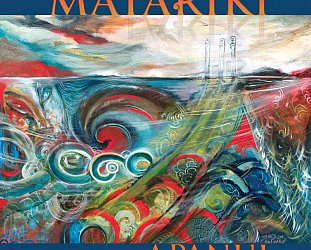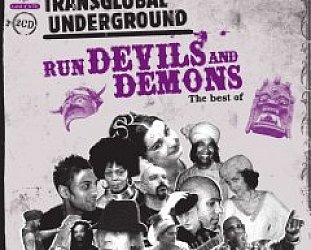Graham Reid | | 2 min read

Dean Hapeta, of Upper Hutt Posse, always aimed for more than bragging and a catchy hook. He styled
himself D-Word and has done spoken-word performances. His new nom de
disque is Te Kupu (aka the Word). I guess that all confirms it: Word
values the power of the word.
As the volatile founder of the Upper
Hutt Posse - sometimes favouring some of Louis Farrakahn's racist
Nation of Islam philosophies but a sincere advocate for Maori
nationalism and self-determination - Hapeta has made some of the most
challenging, uncompromising and, unfortunately, most overlooked music
in this country.
The Posse's Movement in Demand album of '95 was firebrand stuff couched in an appealing conjunction of his
musical past: reggae, hip-hop and rap.
His new album - as Te Kupu - is Ko Te
Matakahi Kupu. Launched on January 1, it
appropriately comes in two versions: te reo and English language -
although Hapeta pointedly keeps the Maori title (The Word Which
Penetrates) for both.
Again, it's a highly personal
confluence of diluted Rasta righteousness rant and Maori nationalism,
plus personal history, Old Testament tropes, some Lee Perry-styled
ragga assertion and kapa haka.
Say what you will about its flinty
politics, you'll have heard nothing like it before out of this
country. Unless it came from Hapeta.
This is the artist as agent provocateur
and a manifesto delivered as a hip-hop concept album.
It suffers the same failings as
Movement in Demand: the words trip over themselves and ultimately
dilute the messages. And the indignation works within a narrow
emotional frame.
Sometimes it falls into wordspinning
for it's own sake ("what is it constant in our character,
resisting perpetration," defies analysis) and the concept hardly
offers itself up easily. Some will find the faux Rasta accents,
seemingly contradictory principles ("fite for peace"), and
relentless irascibleness little more than empty posturing. But time
spent is time rewarded.
Built over beds of evocative reggae,
with some Miles Davis-styled trumpet from Geoff Murphy (yes, the
former Blerta now film-maker one), seductive guitar, snappy
scratching and memorable Te Kupu outbursts, it often provides
compelling if complex arguments for its many political flashpoints.
Like most polemicists, Hapeta doesn't
doubt his "truth," and in that it suffers the same old
failings of politicised music: the leavening out of nuance and
recognition of other viewpoints.
But he's not engaged in a debate, and
in it's indignation and commanding injunctions to get up, stand up
for what he sees as the inalienable rights of a culture oppressed, Ko
Te Matakahi Kupu is hard to turn away from. Because it aims for more
it is inevitable it's failings will be more apparent.
But given the breadth and knottiness of
the manifesto, Te Kupu's ambition and the singularity of the vision,
it demands to be heard.
The Russian poet and propagandist
Vladimir Mayakovsky observed, "Art is not a mirror to reflect
the world, but a hammer with which to shape it."
The question Ko Te Matakahi Kupu asks
is whether you want to be Te Kupu's anvil.







post a comment